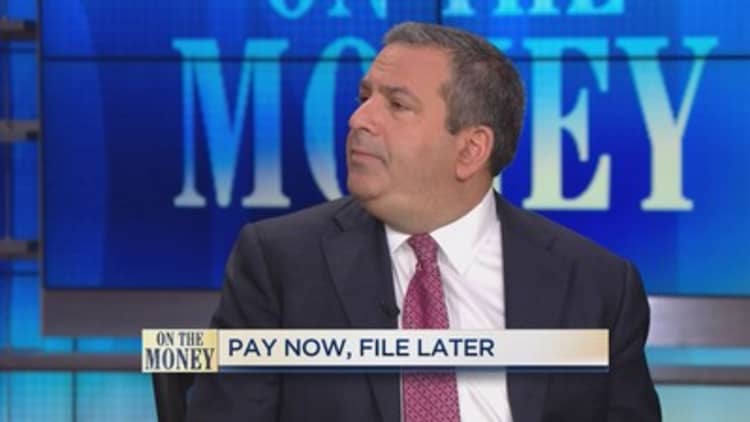
If you still haven't filed your taxes, you're not alone.
Throughout the filing season, fewer taxpayers have been submitting their individual income tax returns to the IRS early.
So far, the federal agency has gotten more than 103 million returns as of April 7, down 3.6 percent from the year-ago period. The filing season started on Jan. 23, and the deadline to pay any taxes owed is Tuesday, April 18.
The IRS expects to receive more than 153 million returns in total.
A deluge of filings should hit the IRS this week. The agency predicted that it would receive as many as 18 million individual income tax returns for the week ending April 15, and procrastinators will submit another 12 million returns this week.
Even though you're facing deadline pressure if you haven't filed, you should keep a cool head.
"With the tax deadline approaching, taxpayers shouldn't panic," IRS commissioner John Koskinen said in a statement.
Get more time
More than 8 million individuals will request additional time to work on their returns through this week, for an estimated total of 13 million extension requests for the year, according to the IRS.
If you file a request with the agency, you can get six more months to polish off your return.
"The most common misconception is 'I need an extension because I don't have the money to pay the taxes,'" said Brian Ashcraft, director of compliance at Liberty Tax Service.
Though you can ask the IRS for more time to complete your return using Form 4868 or by going right to your accountant and asking him or her to file one for you, you'll still need to pay any taxes owed by April 18.
If you requested an extension and paid at least 90 percent of the taxes you owe by the deadline, you may not face a failure-to-pay penalty.
If your taxes owed put your finances in a crunch, ask the IRS about a monthly installment plan. In order to apply for one, you'll need to file all of your required tax returns.
There is a fee for the convenience: An installment agreement that debits the amount owed from your checking account can cost as much as $107.
Find the right pro
The majority of last-minute filers are likely to be e-filers, according to the IRS's estimates.
Of the 18 million individual income tax returns the agency predicted to be filed last week, 16 million are expected to be submitted electronically.
Do-it-yourselfers can file an extension through the IRS's Free File site.
However, if you're looking for a professional to estimate your tax burden and file a request for extension, you should get a trusted recommendation. Avoid the mad rush to the first tax prep office with an open time slot.
"If you don't have a preparer, this isn't the time to pick one — you don't want to settle," said Cari Weston, director of tax practice and ethics at the American Institute of CPAs.
Start with last year
Take a look at last year's returns in order to kick off this year's filing.
If your CPA or preparer gave you a tax organizer last year, use it as a guide to gather your necessary paperwork.
Last year's filings should also give you an indication of whether you're forgetting valuable deductions or credits as you prepare this year's return.
"Start with your income and cross off the obvious, like W-2s and 1099s," said Debbie J. Freeman, director of tax and financial planning at Peak Financial Advisors in Denver. "Then think about one-off income items like your fantasy football winnings."
Deductions and credits should be next on your list. Here are the deductions people often miss.
Student loan interest: You can deduct the lesser of $2,500 or the amount of interest paid during the year, subject to income phaseouts.
Moving expenses: You moved due to a change in your job and your new workplace is at least 50 miles farther away from your old home versus the distance between your old dwelling and your old workplace.
Property taxes: It's not just your primary home that can qualify, but also your second home and perhaps even your timeshare.
Noncash charitable contributions: Be sure to include your receipts. You'll need to file Form 8283 if your deduction for all noncash gifts over $500.
Contributions to certain tax-advantaged accounts: That includes your health savings account and your individual retirement account.
Miscellaneous deductions: You can claim tax preparation fees, un-reimbursed employee expenses and other costs that exceed 2 percent of your adjusted gross income.
Medical deductions: You can deduct qualified medical expenses that exceed 10 percent of your adjusted gross income for that year. Spoiler alert: Most cosmetic surgeries won't fly.
"Often breaking the task into smaller pieces makes it more manageable," Freeman said.


